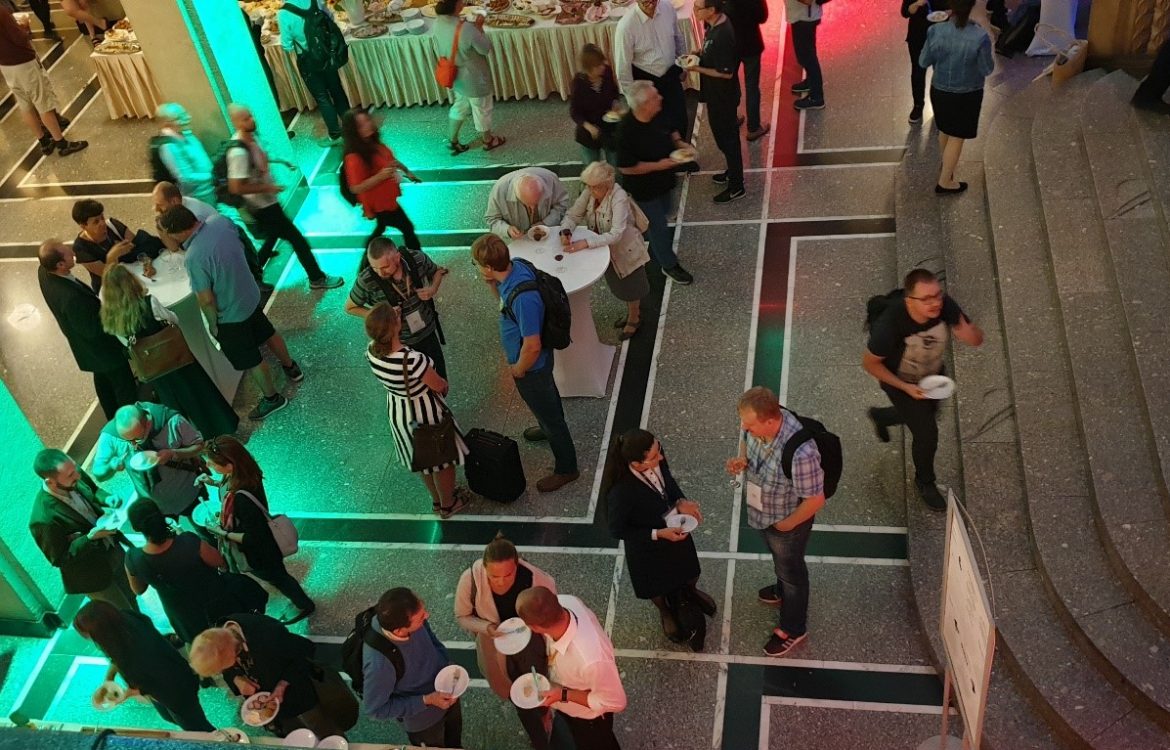
On the Trail of Women in Mathematics: a conference dedicated to Sofia Kowalewska
by Urszula Foryś
The second Conference of Polish Women in Mathematics took place in 2019 at The AGH University of Science and Technology in Kraków. It was devoted to Princess of mathematics – Sofia Kowalewska (Russian: Со́фья Васи́льевна Ковале́вская), see the event web page.
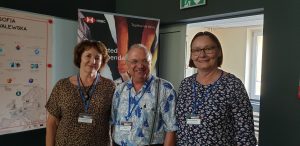 The conference was organised by Polish Society for Women in Mathematics with Faculty of Applied Mathematics of the AGH University of Science and Technology and the Faculty of Mathematics and Natural Sciences of the University of Rzeszow.
The conference was organised by Polish Society for Women in Mathematics with Faculty of Applied Mathematics of the AGH University of Science and Technology and the Faculty of Mathematics and Natural Sciences of the University of Rzeszow.
The Organising Committee consists of: Stanisława Kanas, Urszula Foryś, Anna Gryboś, Aleksandra Hankus, Krystyna Jaworska, Barbara Pękala, Jerzy Stochel.
The Scientific Committee consists of: Stanisława Kanas (University of Rzeszow) – chair, Ewa Damek (University of Wroclaw), Urszula Foryś (University of Warsaw), Urszula Ledzewicz (Lodz University of Technology, Southern Illinois University Edwardsville, USA), Małgorzata Migda (Poznan University of Technology), Piotr Oprocha (AGH University of Technology), Marie-Francoise Roy (University of Rennes 1, Francja), Ryszard Rudnicki (Instytut Matematyczny PAN), Robert Wolak (Jagiellonian University).
Sofia Kowalewska (Russian: Со́фья Васи́льевна Ковале́вская) was born on January 15, 1850 in Moscow. Sofia’s father, Wasilij Wasiljewicz Krukowski, a descendant of the Polish family of Korwin Krukowski, was an artillery officer, her mother Jelizawieta Fiodorowna Schubert came from a German family. Both parents were well educated representatives of the Russian nobility.
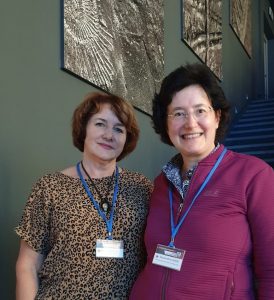 At the age of 18, Sofia married a young geologist and paleontologist Włodzimierz Kowalewski, with whom, in 1869, she left for Germany. In Heidelberg, she wanted to study mathematics and natural sciences, but as a woman she could not be admitted to the university. However, she managed to get permission to attend lectures as a free listener.
At the age of 18, Sofia married a young geologist and paleontologist Włodzimierz Kowalewski, with whom, in 1869, she left for Germany. In Heidelberg, she wanted to study mathematics and natural sciences, but as a woman she could not be admitted to the university. However, she managed to get permission to attend lectures as a free listener.
Sofia studied there successfully for three years. In 1871, she moved with her husband to Berlin. For four years she took private lessons from a professor at the University of Berlin, Karl Weierstrass. Working under the direction of Weierstrass, she wrote three works in mathematics, on the basis of which in 1874 the University of Göttingen gave her, as the first European woman, the title of doctor of philosophy. The three papers were on Partial differential equations, Abelian integrals and Saturn’s Rings.
Sofia was not only a great mathematician, but a multi-talented person — she knew several foreign languages and was the author of several literary positions including a memoir A Russian Childhood, two plays (in collaboration with Duchess Anne Charlotte Edgren-Leffler) and a partly autobiographical novel Nihilist Girl (1890), (sources:[1], [2]).
The main purpose of the Conference was to provide a forum for the exchange of ideas and present the latest research. This conference was the second of a series of conferences aimed at promoting the achievement and merits of women whose research, professional activity and publications have made significant contributions to the development of science, mainly in mathematics and related sciences.
The conference topics covered multiple issues related to PDE and their applications, analysis of compressible and incompressible fluid mechanics, general relativity theory, kinetic theory, probabilistic approaches, etc. The conference also concentrated on pioneering Kowalewska role as a female mathematician.
The conference was one of the elements of the celebration of the 100th Jubilee of AGH, the Year of Mathematics and the 100th Anniversary of the Polish Mathematical Society.
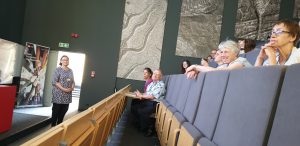 The plenary talks described the role of Kowalewska as well as the meaning of women in maths. Therefore, only one of the plenary lectures was devoted to Kowalewska’ life and achievements. The program included plenary lectures covering a wide range of topics; the titles of the plenary lectures are below:
The plenary talks described the role of Kowalewska as well as the meaning of women in maths. Therefore, only one of the plenary lectures was devoted to Kowalewska’ life and achievements. The program included plenary lectures covering a wide range of topics; the titles of the plenary lectures are below:
- Agnieszka Bartłomiejczyk, Gdansk University of Technology, Poland, The Tikhonov method in gene expression models
- Alessandra Celletti, Department of Mathematics, University of Rome “Tor Vergata”, Italy, Integrable versus non-integrable systems in Celestial Mechanics
- Stanisław Domoradzki, University of Rzeszow, Poland, Sofia Kowalewska– the first woman professor holding a university chair
- Tadeusz Iwaniec, Syracuse University, USA & University of Helsinki, Finland, On Ball-Evans Conjecture
- Magdalena Nockowska-Rosiak, Lodz University of Technology, Poland, Asymptotic properties of solutions to nonlinear second–order difference equations
- Marta Lewicka, University of Pittsburgh, USA, Quantitative immersability of Riemann metrics and the infinite hierarchy of prestrained shell models
- Anna Zatorska-Goldstein, University of Warsaw, Poland, Women in PDE’s – regularity issues for nonlinear equations and systems
- Anna Żeromska, AGH University of Science and Technology, Poland, Mathematical thinking and learning
2 plenary speakers mentioned the importance of women scientific achievements.
- Bronisław Jakubczyk, Institute of Mathematics, Polish Academy of Science spoke about Karen Uhlenbeck and her mathematics Abel Prize 2019
- Jan Boroński, AGH University of Science and Technology, Poland, On mathematical gems of Krystyna Kuperberg, and how they got to me
In addition, we had 44 contributed short talks and 7 in the following sessions:
- Didactics
- Applied Mathematics
- Discrete Mathematics
- Topology and Dynamical Systems
- Mathematical Modelling in Biosciences
- Complex Analysis
- Mathematical Modelling and Fuzzy Sets
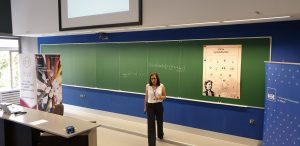 During the next day, plenary lectures and special sessions related to the various parts of mathematics (differential equations, applied mathematics, topology, graph theory and didactic of mathematics) took place.
During the next day, plenary lectures and special sessions related to the various parts of mathematics (differential equations, applied mathematics, topology, graph theory and didactic of mathematics) took place.
The panel discussion “Mobbing at the universities” was an important point in the conference schedule and was moderated Urszula Foryś and Stanislawa Kanas. There was a true discussion, involving several mathematicians in the audience. All shared their experiences and views, often painful, in their work at the university. It must be said that the discussion did not finish with the panel but went on until the end of the meeting.
All details could be found on the conference web page.
As a conclusion, the conference organised by the Polish Society for Women in Mathematics was planned as the first in the cycle “On the Trail of Women in Mathematics” and achieved a great success. The cycle will be continued.
* Photo credits: Stanisława Kanas.
Text comment...
Leave a Reply
You must be logged in to post a comment.